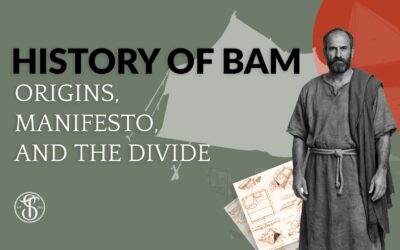The Creation Mandate and the Great Commission: Let’s Be Both-And People

Back when I began this whole Missional Marketplace journey, I attended a faith and work conference in New York. The event drew attendees from all over the country and from a wide variety of faith backgrounds and denominational affiliations.
The conference was incredible—not only in the content shared, but in the vast perspectives and experiences of the people I met. When you step outside your own community for a while, you realize the wide array of image bearers reflecting God’s Kingdom all over the world. We really are unity in diversity.
I was a real Midwestern “fried tenderloin” at a Northeastern “kale and quinoa” event. And not only did I sense the differences in our culinary tastes, I felt them in our theology and missiology too.
When I was asked about our organization and what we do with marketplace engagement by some guys in the row in front of me, I went straight to our gospel-access passion: we leverage business to reach the world with the Gospel. We see business as an incredible opportunity to both fund global missions and tangibly plant the Church where the Church is not.
There were some polite nods, but it was obvious I had swerved into strange waters for them. These guys were starting aquaponics farms in inner-city food deserts. Their passion was to feed the poor and use marketplace development to fix economic injustices.
They found our work noble—but what about co-creating with God, caring for the poor, and loving and serving people through our work?
I found their work noble—but what about proclaiming Jesus to those who have never heard and establishing the Church among the unreached?
That conversation stuck with me. It wasn’t just a difference in projects—it revealed a difference in starting points. Are we called primarily to restore creation or to reach the nations? The more I thought about it, the more I realized Scripture calls us to both. But priority does matter.
The Creation Mandate
When God created the heavens and the earth, He fashioned us in His image to work and keep (Genesis 2:15) as well as form, fill, and subdue (Genesis 1:28) all that He had made. Theologians call this the Creation Mandate. From the first pages of Scripture, we were called into partnership with our Maker.
That’s not just poetic language—it’s sacred purpose. Before sin entered the story, humanity had a mission: to reflect God’s character and steward His creation. Work wasn’t punishment, it was partnering with God in stewarding His creation. This is still true of you and I today.
You and I are in a joint venture with the Creator of the Universe!
How’s that for a job description? This is true of the simplest of jobs to the most complex. Our work was always intended to be a continuation of God’s work in the world. This is one of the reasons we believe work of all kinds is sacred.
In my missions-obsessed upbringing, I never heard much—if any—of this. If you weren’t called to pastor a church or go to the mission field, you were “just” sentenced to work in the secular marketplace. Marketplace Christians were meant to engage the heathen spheres of fallen creation and drag back as many resources as possible so that the Christians with sacred callings could do the real work of the ministry.
A Theology of Omission
Of course, we never said it that way. In fact, that’s kind of the point. We never really said anything about it at all. My theological understanding of marketplace work was assumed, not taught. It was a theology of omission. If I wasn’t “called” to ministry, I just backed into my own (wrong) assumptions about what the marketplace was all about:
- Work is hard and often pointless, so it must be the result of the Fall.
- Work is for this world only, because in heaven we’ll lay on clouds and play harps for eternity—or something like that.
- Work has no eternal value, so its only redemptive purpose is to fund charitable giving.
Looking back, I realize my theology of work wasn’t maliciously wrong—it was just missing a chapter.
This was my assumed theology. So when I first heard about the Creation Mandate, it rocked me in a good way. It meant the marketplace was part of God’s Kingdom work in the world! It meant my Monday could be as sacred as my Sunday. It meant the business world could be a small foretaste of the fullness of Christ’s Kingdom that is yet to come.
That’s what my new “kale and quinoa” friends were all about—and something about it deeply resonated with me. I was obsessed with the Great Commission, but when Jesus said, “Go and make disciples of all nations,” He didn’t cancel the Creation Mandate. We are called to recapture God’s original design in this already/not yet reality in which we live. This made so much sense to me and generated all kinds of energy and Kingdom purpose around my marketplace day job.
And that Creation Mandate was the driving force of my new friends. They embraced the idea that everyday work is part of God’s redemptive story and, redeemed by Christ, is a beautiful mechanism for loving our neighbor and making a real difference in the world. That passion energized me!
But they also carried a side-eye, colonial cynicism toward my passion for using business as a missionary endeavor. That felt off to me. While the Creation Mandate gives biblical purpose to our everyday work, without a clear emphasis on proclaiming Jesus as King, making disciples, and establishing the Church, we risk embracing a gospel of “nice and good” social impact with no power for true transformation and renewal.
But swinging the other direction isn’t the answer either. If the Creation Mandate gives meaning to our work, the Great Commission gives it a mission. One shows us what we’re made for; the other tells us who it’s all for.
The Great Commission
Why are we so obsessed with the Great Commission? Because Jesus’ last command to His followers as He ascended to heaven was clear:
“Go and make disciples of all nations.” (Matthew 28:19)
“Go into all the world and preach the gospel to all creation.” (Mark 16:15)
This was the ultimate gospel purpose I was raised with and still prioritize to this day. In fact, I would go as far as to say this is not an optional command for some of God’s people—it is the mission of the Church.
Jesus said:
- Go: Move out, get going—it’s a motion word!
- Make Disciples: Train up followers who put their trust in Jesus and orient their lives around His lordship of all creation.
- All Nations: This isn’t “nation-states” as we know them, but the word ethne, or people groups.
And yet today, 2,000 years after Jesus commissioned His Church, more than 3.5 billion people—42% of the global population—remain unreached with the Gospel. Many have never even met a follower of Jesus, let alone heard the life-giving message of the Gospel.
That reality should sober us. Our work and witness are meant to intersect—our hands doing good, our mouths declaring good news.
Here’s what I believe:
The Great Commission certainly doesn’t cancel the Creation Mandate. And for marketplace believers like me, that’s fantastic news—Kingdom purpose for our everyday work and for the business world itself. The implications of the Gospel must be demonstrated by every follower of Christ in every sphere of this life, or our words are empty and powerless.
But…
The Creation Mandate doesn’t replace our priority of proclaiming the Gospel to every nation, tribe, and tongue. This isn’t a buffet line where we choose which main course we care about. All of us, in every sphere of life—from the church, to the mission field, to the marketplace—carry a responsibility to the 42% of the global population that has little to no gospel access.
Why Proclamation Still Matters
And as much as social and economic impact will be fruits of the Kingdom, we must proclaim Jesus. The finished work of Christ will not be assumed by those who interact with us. Good works will accompany the Kingdom, but they do not define the Kingdom—Jesus does. This is true for marketplace believers from Indianapolis to Indonesia. We are called to have the name of Jesus on our lips.
This isn’t an either/or choice between building culture and preaching Christ—it’s a call to do both with clarity and conviction.
Following the Lausanne Conference in September 2024, Ed Stetzer wrote:
“If we don’t prioritize evangelism, we will lose evangelism.”
So, missions-obsessed Christians, let’s rediscover the power of the Creation Mandate—to renew sacred purpose and redeem everyday marketplace work as a daily opportunity to demonstrate the Kingdom.
And…
Let’s rediscover the priority of evangelism in every sphere of this life, including the marketplace and the business world. The Creation Mandate doesn’t replace the priority of the Great Commission. In fact, the Great Commission is what makes the Creation Mandate truly possible.
The world is not how it should be, and if we don’t announce the only One who can repair the brokenness, our good works have no lasting eternal value. We can’t truly demonstrate the Gospel if we’re not also declaring it.
The Creation Mandate and the Great Commission. Let’s be both-and people.



